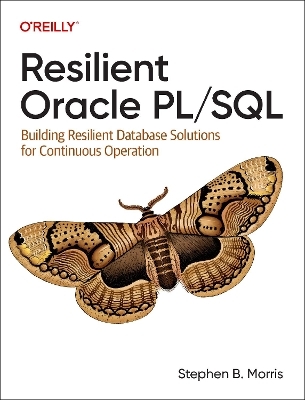
Resilient Oracle Pl/SQL
building resilient database solutions for continuous operation
Seiten
2023
|
1. Auflage
O'Reilly Media (Verlag)
9781098134112 (ISBN)
O'Reilly Media (Verlag)
9781098134112 (ISBN)
As legacy and other critical systems continue to migrate online, the need for continuous operation is imperative. Code has to handle data issues as well as hard external problems today, including outages of networks, storage systems, power, and ancillary systems. This practical guide provides system administrators, DevSecOps engineers, and cloud architects with a concise yet comprehensive overview on how to use PL/SQL to develop resilient database solutions.
Integration specialist Stephen B Morris helps you understand the language, build a PL/SQL toolkit, and collect a suite of reusable components and patterns. You'll dive into the benefits of synthesizing the toolkit with a requirements-driven, feature-oriented approach and learn how to produce resilient solutions by synthesizing the PL/SQL toolkit in conjunction with a scale of resilience.
Build solid PL/SQL solutions while avoiding common PL/SQL antipatterns
Learn why embedding complex business logic in SQL is often a brittle proposition
Learn how to recognize and improve weak PL/SQL code
Verify PL/SQL code by running data-driven, in-database tests
Understand the safe operation, maintenance, and modification of complex PL/SQL systems
Learn the benefits of thinking about features rather than just use cases
Define good requirements for PL/SQL and hybrid solutions involving PL/SQL and high level languages
Integration specialist Stephen B Morris helps you understand the language, build a PL/SQL toolkit, and collect a suite of reusable components and patterns. You'll dive into the benefits of synthesizing the toolkit with a requirements-driven, feature-oriented approach and learn how to produce resilient solutions by synthesizing the PL/SQL toolkit in conjunction with a scale of resilience.
Build solid PL/SQL solutions while avoiding common PL/SQL antipatterns
Learn why embedding complex business logic in SQL is often a brittle proposition
Learn how to recognize and improve weak PL/SQL code
Verify PL/SQL code by running data-driven, in-database tests
Understand the safe operation, maintenance, and modification of complex PL/SQL systems
Learn the benefits of thinking about features rather than just use cases
Define good requirements for PL/SQL and hybrid solutions involving PL/SQL and high level languages
Stephen Morris is an independent writer and consultant based in Ireland. Widely experienced in enterprise development and networking applications, he has worked for some of the world's biggest networking companies. Stephen has been writing code professionally since the early nineties, and his technology journal has taken him to various industries, including telecoms, finance, healthcare, and government.
| Erscheinungsdatum | 16.05.2023 |
|---|---|
| Zusatzinfo | Illustrationen |
| Verlagsort | Sebastopol |
| Sprache | englisch |
| Maße | 178 x 233 mm |
| Themenwelt | Informatik ► Datenbanken ► Oracle |
| Mathematik / Informatik ► Informatik ► Programmiersprachen / -werkzeuge | |
| Informatik ► Software Entwicklung ► User Interfaces (HCI) | |
| Mathematik / Informatik ► Informatik ► Theorie / Studium | |
| ISBN-13 | 9781098134112 / 9781098134112 |
| Zustand | Neuware |
| Informationen gemäß Produktsicherheitsverordnung (GPSR) | |
| Haben Sie eine Frage zum Produkt? |
Mehr entdecken
aus dem Bereich
aus dem Bereich
